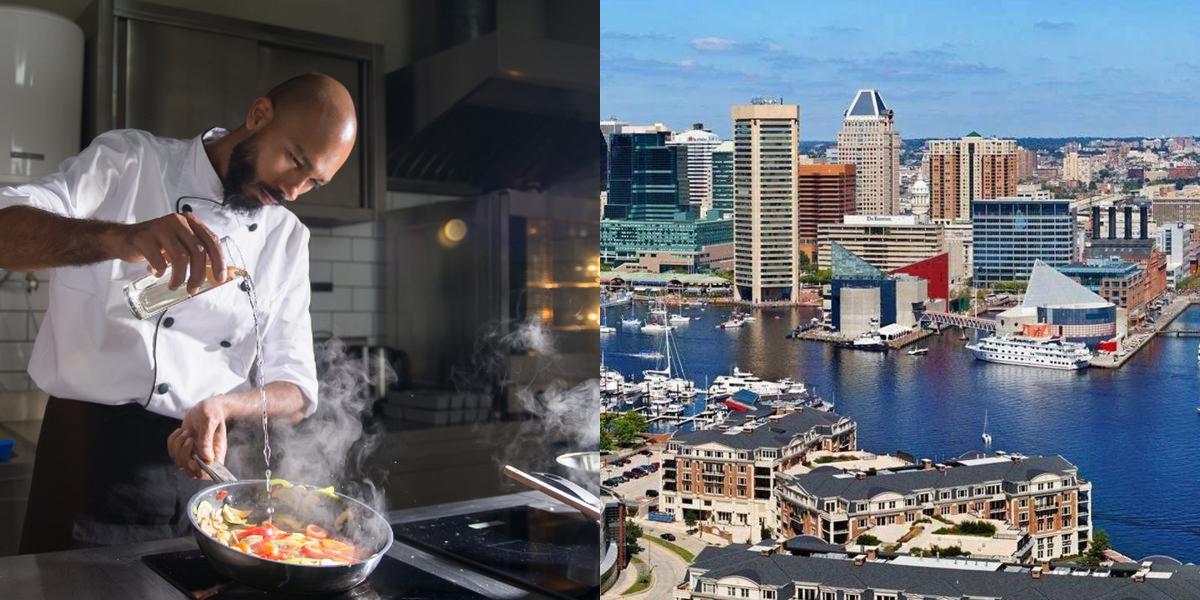How to Become a Chef in Maryland (2024)

Becoming a chef opens the door to a dynamic career filled with creativity and opportunities. In this blog, we'll explore the steps to pursue a chef job, what to expect from a chef salary, and how to succeed in the culinary arts.
Key Points
- A chef is a culinary artist responsible for creating and preparing delicious and visually appealing dishes, managing kitchen operations, and overseeing food quality.
- To become a chef in Maryland, you'll need formal culinary education and certifications like a food handler's card or ServSafe certification.
- Culinary arts programs typically take 1-2 years to complete, including practical training and certification exams.
- In Maryland, the average chef salary is around $66,560 per year.
- Career opportunities for chefs include roles such as executive chef, pastry chef, personal chef, and more, each offering unique paths and specializations.
Career Paths and Opportunities after Becoming a Culinary Arts
After obtaining your culinary arts certification and gaining some work experience, there are various career paths and opportunities available to you in the culinary arts industry. Here are a few potential career paths:
-
Executive Chef: As an executive chef, you would be responsible for overseeing the entire kitchen operation. This includes menu planning, recipe development, supervising staff, and ensuring food quality and safety. Executive chefs often work in high-end restaurants, hotels, or resorts.
-
Sous Chef: A sous chef is the second-in-command in the kitchen and assists the executive chef in managing the kitchen operations. Sous chefs are responsible for supervising staff, organizing the kitchen, and ensuring smooth food preparation. This role is a stepping stone to becoming an executive chef.
-
Pastry Chef: If you have a passion for baking and desserts, becoming a pastry chef is a great career path. Pastry chefs specialize in creating pastries, cakes, bread, and other sweet treats. They often work in bakeries, cafes, or high-end restaurants.
-
Personal Chef: Personal chefs work directly with individual clients or families to prepare meals in their homes. This can be a rewarding career path if you enjoy working one-on-one with clients and have a flair for creating customized menus.
-
Catering Chef: Catering chefs work for catering companies or event venues and are responsible for planning and executing large-scale events. This can include weddings, corporate events, and parties. Catering chefs need strong organizational and communication skills to ensure a smooth event.
-
Culinary Instructor: If you enjoy teaching and sharing your passion for cooking, becoming a culinary instructor can be a fulfilling career path. Culinary instructors work in culinary schools, community colleges, or vocational schools, teaching aspiring chefs the skills and techniques of the culinary arts.
-
Food Stylist: Food stylists work in the media industry, such as advertising, magazines, or film, to make food look appealing for photographs or on-screen. This career path requires creativity, attention to detail, and knowledge of food presentation techniques.
Frequently Asked Questions
How much does a chef earn in Maryland?
In Maryland, chefs and head cooks earn an average salary of $66,560 per year, according to the Bureau of Labor Statistics (BLS) as of May 2023. This figure can vary based on factors such as experience, location, and the type of establishment in which they work.
How do you qualify as a chef?
To qualify as a chef, you typically need a combination of formal education and practical experience. Most chefs start with a degree or diploma in culinary arts from a reputable school, followed by gaining hands-on experience through internships or entry-level positions. Obtaining certifications such as a food handler's card or ServSafe certification can also be beneficial in meeting industry standards and demonstrating your competency in food safety.
What is the fastest way to become a chef?
The fastest way to become a chef involves completing an accelerated culinary arts program, which usually takes around 6-12 months. Alongside formal education, gaining practical experience through internships or entry-level kitchen positions can help you quickly develop the necessary skills. Networking within the industry and obtaining relevant certifications can further enhance your job prospects and expedite your entry into the culinary field.
Final Thoughts
Obtaining a culinary arts certification and pursuing a career as a chef can be both rewarding and lucrative. By selecting a reputable program, gaining practical experience, and networking with industry professionals, you can enhance your chances of success and increase your chef salary. Stay updated with industry trends and continually refine your skills to maximize your opportunities in the culinary arts.
If this article isn't quite hitting the mark for you, why not give these other articles a try:

Alyssa Jane is part of the customer success team at Dreambound. She works with students, training providers, and employers, helping them have a smooth customer journey. She is also an ESL tutor and Licensed Psychometrician. She is fond of traveling, photography, and discovering new restaurants.





